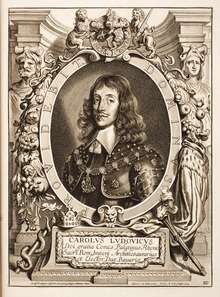Charles I Louis, Elector Palatine
| Charles I Louis, Elector Palatine | |
|---|---|
 Charles I Louis, Elector Palatine | |
| Born |
22 December 1617 Heidelberg |
| Died |
28 August 1680 (aged 62) near Edingen |
| Noble family | Wittelsbach |
| Spouse(s) |
Charlotte of Hesse-Kassel Marie Luise von Degenfeld Elisabeth Hollander von Bernau |
| Father | Frederick V, Elector Palatine |
| Mother | Elizabeth of Bohemia |
Charles Louis, (German: Karl I. Ludwig), Elector Palatine KG (22 December 1617 – 28 August 1680) was the second son of German elector Frederick V of the Palatinate, the "Winter King" of Bohemia, and his wife, Elizabeth of England.
English politics

After the death of his older brother, Henry Frederick, in 1629, and of his father in 1632, Charles Louis inherited his exiled father's possessions in the Electorate of the Palatinate. Along with his younger brother Rupert, he spent much of the 1630s at the court of his maternal uncle, Charles I of England, hoping to enlist English support for his cause. The young Elector Palatine was largely unsuccessful in this, and became gradually estranged from the King, who feared that Charles Louis might become a focus for opposition forces in England. Indeed, in the English crisis leading up to the outbreak of the English Civil War, Charles Louis had considerable sympathy for the parliamentary leaders, especially the Earl of Essex, feeling them more likely to come to the aid of the Palatinate on the continent. The Prince Palatine supported the execution of Strafford. Although Charles Louis was involved in the early stages of the Civil War with his uncle, he was mistrusted for his parliamentary sympathies, and soon returned to his mother in The Hague. There he distanced himself from the royalist cause in the Civil War, fearing that Charles would sell him out for Spanish support.

In 1644, Charles Louis returned to England at the invitation of Parliament. He took up residence in the Palace of Whitehall and took the Solemn League and Covenant, even though his brothers, Rupert and Maurice, were Royalist generals. Contemporaries (including King Charles) and some in subsequent generations believed that Charles Louis' motive in visiting Roundhead London was that he hoped that Parliament would enthrone him in place of his uncle. Charles Louis' endorsement of the Parliamentary party was a cause of enmity between uncle and nephew, and when a captive Charles I met his nephew once again in 1647, the elder Charles accused the Prince of angling for the English throne. Charles Louis was still in England in October 1648 when the Peace of Westphalia restored the Lower Palatinate to him (the Upper Palatinate, to his great disappointment, remained under the Elector of Bavaria). He remained in England long enough to see the execution of his uncle in January 1649, which appears to have come as a shock. The two had not reconciled prior to the King's death - Charles refused to see his nephew before his execution.
Electorate
After this unhappy dénouement to Charles Louis's participation in English politics, he at last returned to the now devastated Electorate of the Palatinate in the autumn of 1649. Over the more than thirty years of his reign there, he strove with some success to rebuild his shattered territory. In foreign affairs, he pursued a pro-French course, marrying his daughter Elizabeth Charlotte to Philip I, Duke of Orléans, Louis XIV's brother, in 1671. After his restoration, his relations with his relatives continued to deteriorate - his British relations never forgave him for his course in the Civil War, while his mother and siblings resented his parsimony.
The most notable facet of his reign was probably his unilateral divorce of his wife, Charlotte of Hesse-Kassel, and subsequent bigamous marriage to Marie Luise von Degenfeld. This second wife was given the unique title of Raugravine (Raugräfin, countess of uninhabited or uncultivated lands), and their children were known as the Raugraves.
Ancestry
| Ancestors of Charles I Louis, Elector Palatine |
|---|
|
|
Family
| Lover | Unknown |
| Children |
|
| Wife 1 | Charlotte of Hesse-Kassel, 20 November 1627 – 16 March 1686, Kassel |
| Married | 22 February 1650 Kassel |
| Children |
|
| Wife 2 | Marie Luise von Degenfeld, 28 November 1634 – 18 March 1677, Strasbourg |
| Morganatically Married | 6 January 1658 Schwetzingen |
| Children |
|
| Wife 3 | Elisabeth Hollander von Bernau, 1659 - 8 March 1702 Schaffhausen |
| Morganatically Married | 11 December 1679 Schloss Friedrichsburg |
| Children |
|
| Charles I Louis, Elector Palatine Cadet branch of the House of Wittelsbach Born: 22 September 1617 Died: 28 August 1680 | ||
| Regnal titles | ||
|---|---|---|
| Preceded by Frederick V |
Elector Palatine 1648 (1632)-1680 |
Succeeded by Charles II |
References
| Wikimedia Commons has media related to Charles I Louis, Elector Palatine. |